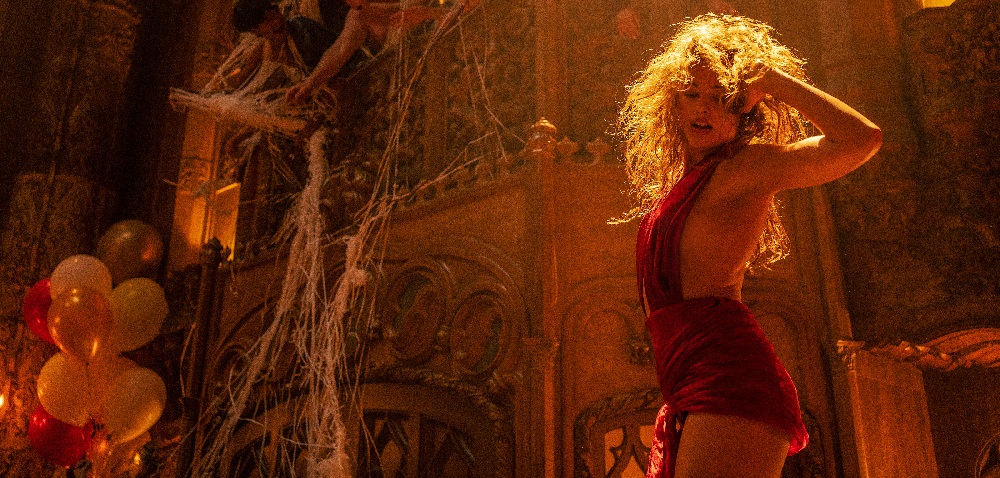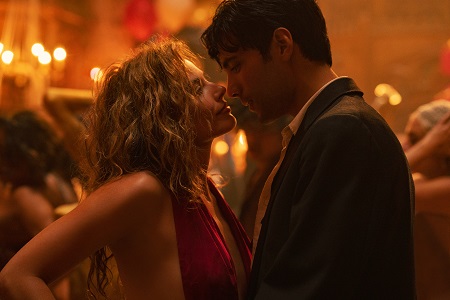
Once More Without Feeling, Chazelle’s Babylon is a Visually Rapturous Hollywood Nightmare
Damien Chazelle’s Babylon opens with an elephant defecating on its handler as a determined trio attempts to transport it to a hedonistic party thrown by studio mogul Don Wallach (Jeff Garlin). Things only get more vulgar, crazy, and absurd from there. Like some bacchanalian fever dream that would cause filmmakers like Pier Paolo Pasolini, Federico Fellini, Rainer Werner Fassbinder, or Bernardo Bertolucci to rise from their graves and either applaud or rush to the nearest lawyer to sue for defamation (probably both), Chazelle’s ribald flight of self-destructive fantasy is certainly one of the more audacious Hollywood productions in recent memory.
But is it any good? To Chazelle’s credit, that’s a question without an easy answer. I cannot say I enjoyed all three hours of this cartoonish dive into tragedy and exploitation. Much of it turned my stomach, and not in a good way. Yet I was also blown away by the opening act, impressed by some frenziedly untidy set pieces, and left jubilantly stunned by Margot Robbie’s maniacally luminous performance as wannabe starlet Nellie LaRoy.
Chazelle’s sprawling pic opens in 1926, and most of the opening act takes place at the orgiastic bash at Wallach’s secluded mansion. It is here that the film’s central trio is introduced: Manny Torres (Diego Calva), Jack Conrad (Brad Pitt), and the aforementioned Nellie LaRoy. Manny is one of Wallach’s primary lackies, taking care of problems as weird as figuring out how to truck an elephant to a party and as potentially homicidal as transporting a naked, catatonic actress to the hospital before she dies from a semi-forced drug overdose.
Manny dreams about getting onto a set and taking part in the making of cinematic magic. An inadvertent friendship with a drunken Conrad is the serendipitous key to making this fantasy a reality; the lacky takes the silent film star home and the two hit it off. The next thing young Manny knows, he’s shooting a massive biblical epic in the hot California desert with Conrad, having quickly become the powerful, charismatic actor’s go-to production assistant.
Nellie is that stereotypical small-town girl with big-time Hollywood dreams. She’s lightning in a bottle, and when chance smiles and gives her a shot, the young woman doesn’t disappoint. Nellie walks onto the set of a low-budget Western melodrama as a featured extra and leaves a bona fide sensation, taking the world by storm with her brazen, no-holds-barred, sexually provocative flirtatiousness.
Chazelle has crafted classic tale, a “be careful what you wish for” tragicomedy that follows Manny, Jack, and Nellie as they each make the transition from silents to talkies with varying degrees of success. The whole thing plays like Singin’ in the Rain on a cocktail of methamphetamine, cocaine, 30-year-old scotch, and steroids, every beat punctuated with the omnipresent, jazzy vivacity of composer Justin Hurwitz’s gargantuan score. The film assaults the senses with lunatic abandon, this chaotic mélange steadfastly refusing to relent for a second of its mammoth 188-minute running time.
Yet as impressive as all this may be from a technical perspective — Linus Sandgren’s (No Time to Die) cinematography, Florencia Martin’s (Licorice Pizza) production design, Mary Zophres’ (The Tragedy of Macbeth) costumes, and Tom Cross’ (Hostiles) editing are all phenomenal — Chazelle’s wildly overstuffed passion project frequently left me emotionally cold. The film lacks the focus of the director’s best projects, La La Land and First Man, and is more invigorating in brief spurts than it is as a cohesive whole.
What really drove me nuts was the movie’s aggressive nihilism. I get wanting to tell a tale about the not-so-pretty price of artistic achievement, but the ugliness at the center of Babylon is maddening. Chazelle becomes so enamored with all the bells and whistles of what he’s doing he forgets to craft characters worth caring about, and it is only due to the collective strength of his cast I felt anything whatsoever for Manny, Jack, and Nellie.
Even worse, Chazelle pairs all this grandiose, ghoulish nonsense with a single contemplative scene between Pitt’s Jack Conrad and powerful tabloid journalist Elinor St. John, played with suitably flamboyant aplomb by a scene-stealing Jean Smart. She lectures Jack on the lasting power of his accomplishments, reassuring him that his films will stand the test of time and that no one will remember the ignoble way his time as an international superstar concluded.
While Elinor is right, I wonder if Chazelle only wanted to get this scene into his film to justify the bleak oppressiveness of his central thesis. Crowning this hypocrisy is an epilogue in which, roughly two decades after the primary events have concluded, one of this trio of oddballs wanders back into an L.A. theater to joyfully discover their collective tragedy has been used as the foundation for a star-studded Technicolor musical comedy.
As happy endings go, the only thing this one did was make me angry. I know what Chazelle is trying to say with Babylon, but it’s all for naught. It’s sensation without feeling; showmanship without ingenuity. While the director is a consummate craftsman who stages several staggering scenes of razzle-dazzle, it’s all pugnaciously heartless. To put it even more bluntly: I couldn’t have cared less.
– Review reprinted courtesy of the SGN in Seattle
Film Rating: 2 (out of 4)








